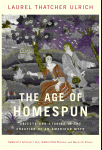|
|
 |
|
|
 |
|
|
 |
 |
 |

|
Using objects that Americans have saved through the centuries and stories they have passed along, as well as histories teased from documents, Laurel Thatcher Ulrich chronicles the production of cloth--and of history--in early America. Under the singular and brilliant lens that Ulrich brings to this study, ordinary household goods--Indian baskets, spinning wheels, a chimneypiece, a cupboard, a niddy-noddy, bed coverings, silk embroidery, a pocketbook, a linen tablecloth, a coverlet and a rose blanket, and an unfinished stocking--provide the key to a transformed understanding of cultural encounter, frontier war, Revolutionary politics, international commerce, and early industrialization in America. We discover how ideas about cloth and clothing affected relations between English settlers and their Algonkian neighbors. We see how an English production system based on a clear division of labor—men doing the weaving and women the spinning--broke down in the colonial setting, becoming first marginalized, then feminized, then politicized, and how the new system both prepared the way for and was sustained by machine-powered spinning.
Pulling these divergent threads together into a rich and revealing tapestry of --the age of homespun,--Ulrich demonstrates how ordinary objects reveal larger economic and social structures, and, in particular, how early Americans and their descendants made, used, sold, and saved textiles in order to assert identities, shape relationships, and create history.
"Once upon a time Harvard was West Podunk in the world of material
culture studies. No longer. Laurel Thatcher Ulrich's appointment
to the faculty and now her trail-blazing book, The Age of Homespun,
redraw the map of an exciting field still full of surprises. Objects
made by and for American women transport readers into a landscape that
alternately teems with personal stories and opens onto stunning
historical perspectives."
--Cary Carson, Colonial Williamsburg Foundation
"Although handmade clothing and textiles are often ignored or marginalized
as antiquarian oddities by academic historians, Laurel Ulrich has carefully
selected examples from which she has been able to tease powerful and
significant stories. Readers will enjoy the individual tales and, through them,
find their understanding of Colonial America a richer web."
-- Jane Nylander, author of Our Own Snug Fireside: Images of the New England
Home
"With her usual magic, Laurel Ulrich finds the world in small
pieces of evidence. Slavery, Indians, international commerce, class,
revolution, gentility all are woven into the fabrics she describes.
Moreover, she finds these weavers, spinners, and embroiderers creating a
culture of homespun later to be memorialized in the formation of American
identity."
-- Richard L. Bushman, author of The Refinement of America: Persons,
Houses, Cities
"THE AGE OF HOMESPUN is a rich blend of history and material culture and of
history and memory that reflects the storytelling and analytic skills of
one of today's finest historians. Laurel Thatcher Ulrich has written a
superb evocation of an important dimension of eighteenth-century America
and its reconstruction by subsequent generations."
-- Thomas Dublin, author of Transforming Women's Work: New England Lives
in the Industrial Revolution
"A yarn of a story? A richly woven text? A tapestry of tales? Readers
of THE AGE OF HOMESPUN will have to reach deep into their baskets of metaphors
to find words to describe this stunning work of scholarship and storytelling,
in which Ulrich asks us to think hard about the spinning of wool--and the
writing of history."
--Jill Lepore, author of The Name of War: King Philip's War and the Origins of
American Identity
"In a unique work of astonishing originality, Laurel Ulrich
has achieved two distinct goals: recreating the textiles that early
Americans made and used, but also the illusions that 19th-century
Americans imagined about their forebears' domestic milieu. She does
all of that with due attention to particularity of place and change
over time--providing a superb example of the gifted historian's craft."
--Michael Kammen, author of American Culture, American Tastes
"In THE AGE OF HOMESPUN, Laurel Thatcher Ulrich explodes an enduring
American myth, one that has isolated early New England women and their
work from such larger historical currents as the colonization of American
Indians and the Industrial Revolution. The result is a deeply intelligent,
richly detailed study that enriches fundamentally our understandings of
early American history and American historical memory."
--Neal Salisbury, author of Manitou and Providence: Indians, Europeans, and
the Making of New England, 1500-1643
|
|
 |
|
|
|



